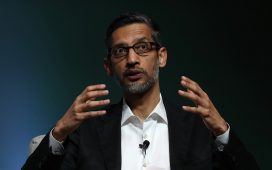Editor’s Note: Morning Money is a free version of POLITICO Pro Financial Services’ morning newsletter, which is delivered to our subscribers each morning at 6 a.m. The POLITICO Pro platform combines the news you need with tools you can use to take action on the day’s biggest stories. Act on the news with POLITICO Pro.
Should we care about inflation? — Fed Chair Jerome Powell takes the stage at 2:30 p.m. after a Fed statement that is not expected to include any changes to the foot-on-the-gas monetary policy aimed at boosting the economy as it continues to struggle — especially on the services end — with escaping the massive drag from Covid-19.
But hanging around in the background will be worries that if we should — God willing — emerge from the Covid nightmare in the second half of the year, massive pent-up demand and heavy savings among higher-earners will lead to a dangerous blast of price inflation that could slam into President Biden’s hopes for a strong recovery.
To be sure … To use the cliché journo-jargon for a third or fourth story paragraph, the big risk right now is not inflationary. It is that new strains of the Covid-19 virus and troubled vaccine distribution will delay any robust recovery, not that full freedom from Covid will explode prices on travel and hotels and everything else that people have not been able to do for going on a year.
But the risk of an inflation spike remains out there and a concern to economists and central bank (and Biden White House) officials. It’s not often we have this kind of totally bifurcated economy in which the lower end of the income spectrum is barely hanging on while the upper end has piled up tons of cash and wants to put it to use.
Via Jim Bianco, president and founder of Bianco Research, who has been flashing some warnings for a while now: “The consensus seems to favor the idea of reflation, but there are worrisome signs that inflation may be an issue. First, personal income has been booming …
“With $900 billion more in stimulus just approved and … Biden pushing for trillions of dollars more, the idea of faster inflation tied to increased demand stemming from booming personal income does not seem too far-fetched. …
“Second, the economy is smaller than it was a year ago. The country is producing fewer goods and services to purchase. The concern is that, whenever vaccines take hold, the mix of more money chasing fewer goods could prove problematic.”
Via Richmond Fed President Tom Barkin as told to our Victoria Guida: “You clearly do see inflation today in certain parts of the economy, I talked to a steel manufacturer yesterday who talked about price increases they’re seeing in steel and other construction materials. … You’ll see some services, think airlines and hotels, where clearly prices are still depressed. … The question of whether you start to see it increase on a 12-month basis after the summer gets down to whether you think you’re going to have significant pent-up demand and whether that’s going to meet constrained supply.”
“All of those suppliers, think airlines, have on notice, don’t worry we’re going to have a vaccine, 50 to 70 percent deployed circa April, June, August, pick your timeframe. … ‘Okay great, I’ll bring some of those aircraft out of the desert, and I’ll schedule to meet demand.’ … Some people will be too optimistic, and some will be too conservative … but I guess it’s not obvious to me that there’s some fundamental constraints that this pent-up demand’s going to hit when you’ve got, call it six- month lead time.”
Via Richard Bernstein Advisors: “For the past several decades, investors have generally been playing limbo with inflation. No matter how much they lowered their expectations, somehow inflation seemed to squeeze under the bar. The limbo dance could be over. Investors should now realize inflation expectations are set very low and inflation seems increasingly likely to hurdle that very low bar.”
GOOD WEDNESDAY MORNING — Email me on [email protected] and follow me on Twitter @morningmoneyben. Email Aubree Eliza Weaver on [email protected] and follow her on Twitter @AubreeEWeaver.
Senate Commerce votes on Pete Buttigieg’s nomination for Transportation Secretary at 10:00 a.m. … Senate Energy has a hearing at 9:30 a.m. on Jennifer Granholm’s nomination to be Energy Secretary at 9:30 a.m. …
FOMC announcement at 2:00 p.m. and Powell presser at 2:30 p.m. not expected to include any policy changes. But Powell will be pressed both on inflation risks as well as downsides to the economy without more fiscal stimulus …
NEW PPP STUDY — Via new research from the JPMorgan Chase Institute out this a.m.: “[R]esearchers found PPP loans bolstered small business cash balances and supported expenses while revenues were depressed.
“Funds would have covered nearly one month of expenses for the typical business operating at the same capacity as in 2019. However, this ratio varied greatly across industries, dependent on the share of payroll in a firm’s total expenses.”
DEMS DILLEMA ON STIMULUS — Our Burgess Everett, Caitlin Emma and Sarah Ferris: “Democrats are facing their first major decision with total control of Washington: whether to wait and see if negotiations with Republicans pan out or move forward unilaterally with a massive coronavirus package.
“Progressives are itching to wield control of the House and Senate and are skeptical that talks between a bipartisan group of senators and … Biden will bear fruit. But moderates say the party needs to be more patient and give the centrists some space to work. And there’s not a lot of time: Critical unemployment benefits now expire on March 14.”
PPP STRUGGLES — Our Zachary Warmbrodt: “The federal government’s flagship small business rescue has doled out about 12 percent of its available funds since restarting Jan. 11, according to figures the Biden administration provided Tuesday, as officials tried to address a growing list of complaints about how the program is working.
“The Small Business Administration said it has approved 400,000 forgivable Paycheck Protection Program loans worth $35 billion in the relief effort’s latest round. The figures indicate that demand is less intense than when the PPP first launched last spring and exhausted $350 billion in less than two weeks, forcing Congress to approve more funding.”
SENTIMENT RISES UNDER BIDEN — Via new data from Morning Consult: “Following … Biden’s inauguration last week, Morning Consult’s daily Index of Consumer Sentiment, based on 6,000 daily interviews with US consumers, saw its second-largest weekly gain in consumer confidence in three years. …
“The 2.48 point increase in confidence this week was driven by a surge in confidence among Democrats, which boosted overall sentiment despite a significant decrease among Republicans.”
KUDLOW TO FOX — Via Fox’s Brian Flood: “Former National Economic Council director Larry Kudlow will host a new weekday show on FOX Business Network … In addition to hosting a daily program on FBN, Kudlow will serve as a contributor offering expert economic and financial analysis across all Fox News Media platforms.”
S&P, NASDAQ SLIP FROM RECORD LEVELS — Reuters’ Chuck Mikolajczak: “The S&P and Nasdaq slipped on Tuesday from record closing levels as investors digested a batch of corporate earnings results, while an expected policy announcement from the Federal Reserve on Wednesday helped to limit moves.”
IMF RAISES GLOBAL GROWTH FORECAST — WSJ’s Paul Kiernan: “The world economy is gearing up for a strong recovery from the pandemic in 2021 after shrinking considerably less than initially feared last year, the International Monetary Fund said Tuesday, though it warned that the outlook is subject to exceptional uncertainty.”
SMALL-BUSINESS OWNERS HAVE BEEN PROMISED MORE PPP APPLICATION HELP — WSJ’s Amara Omeokwe: “Lenders say many small businesses applying for additional help under the government’s coronavirus relief program are finding that efforts to combat fraud are throwing up obstacles to getting money they need to help stay afloat. Now, the Small Business Administration, which runs the Paycheck Protection Program, says help is on the way.
“The issue is tied to flags the Small Business Administration placed on roughly 240,000 initial PPP recipients for everything from clerical errors to indications of possible wrongdoing. Those flags are blocking lenders’ ability to move forward second loans for the borrowers, after the program reopened this month.”
BIDEN TARGETS HOUSING, PRIVATE PRISONS IN FIRST EQUALITY MOVES — Bloomberg’s Mario Parker and Jennifer Epstein: “Biden signed a set of executive orders on Tuesday aimed at improving racial equity across American society, including combating discrimination in housing policies and ending the use of private prisons.
“Biden issued four orders on Tuesday — his first policy response to nationwide protests over institutionalized racism — adding to a long list of executive orders he’s taken aimed at advancing his campaign promises and rolling back former President Donald Trump’s policies.”
RAIMONDO VOICES TOUGH LINE ON CHINA — AP’s Kevin Freking and Mike Schneider: “President Joe Biden’s pick to oversee the Commerce Department took a tough line on China in her confirmation hearing Tuesday, though she stopped short of singling out which Chinese companies should remain on a list that limits their access to advanced U.S. technology.
“If confirmed, as expected, Rhode Island Gov. Gina Raimondo, a former venture capitalist, would be responsible for promoting opportunities for economic growth domestically and overseas.”
BIGGEST U.S. BANKS EMBRACE ‘ROONEY RULE’ POLICIES — WSJ’s Ben Eisen: “Five of the largest U.S. banks publicly committed to mandating a diverse slate of applicants when hiring employees, part of a push to diversify an industry whose top ranks remain largely white and male. JPMorgan Chase & Co., Bank of America Corp., Citigroup Inc., Wells Fargo & Co. and U.S. Bancorp all said they would either adjust policies for considering job candidates or disclose the ones they already have in place.”
WHEN WILL MAJOR ECONOMIES HIT PRE-VIRUS GDP? — Bloomberg’s Ben Holland and Alexandre Tanzi: “In China, it’s already happened. The U.S. should get there in the second half of this year. But Italians and South Africans may have to wait until 2023 — or even longer.
“Those are the dates when output in some of the world’s major economies will return to the status quo ante-Covid-19 — the level achieved at the end of 2019, before the new coronavirus struck — according to the latest forecasts from the International Monetary Fund. The numbers reveal an uneven global recovery after the worst recession since World War II.”






